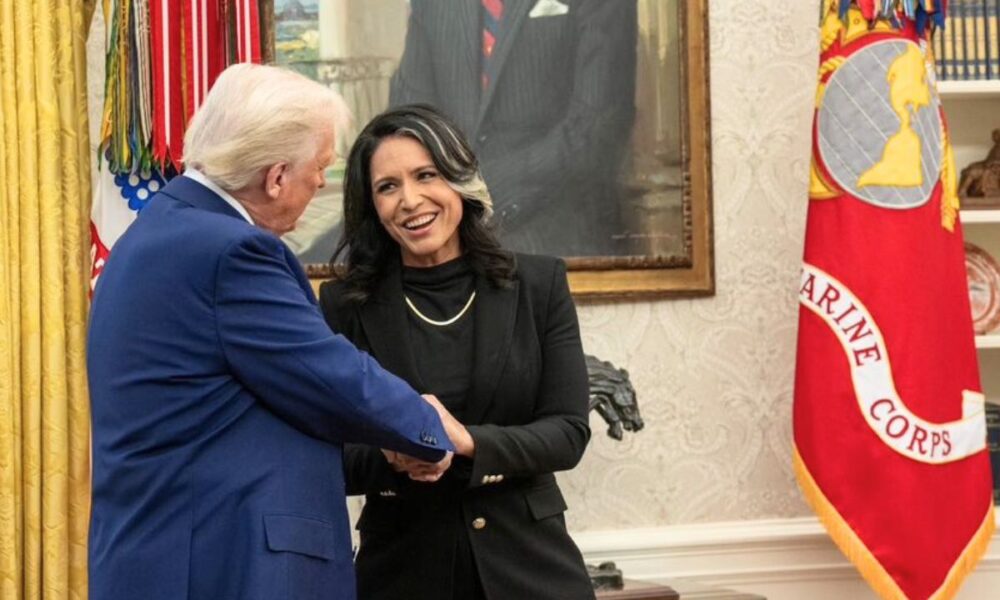President Donald Trump and Director of National Intelligence Tulsi Gabbard claim they’re on the same page about Iran—despite saying seemingly opposite things.
On Tuesday, Gabbard defended herself against accusations that she and the President diverged on Iran’s nuclear ambitions, telling reporters, “We are on the same page.” The former congresswoman insisted that her March testimony—where she said Iran had not resumed its nuclear weapons program—was consistent with Trump’s claim this week that Iran is “very close” to acquiring a nuclear weapon.
“President Trump was saying the same thing that I said in my annual threat assessment,” Gabbard remarked as she arrived at the Capitol to testify before the Senate Appropriations Committee. “Unfortunately, too many people in the media don’t care to actually read what I said.”
@cnn President Donald Trump disputed his own director of national intelligence, Tulsi Gabbard, on how developed Iran’s nuclear capabilities are and said Iran was on the verge of obtaining a nuclear weapon when Israel struck in recent days. #CNN #News
The comments come as fighting continues between Israel and Iran following Saturday’s Israeli airstrikes targeting individuals and facilities allegedly tied to Iran’s nuclear development efforts. The Iranians responded with their own strike on Sunday, and both sides have since exchanged additional blows. Trump has offered strong public support for Israel and hinted that further U.S. action may be forthcoming.
The alignment between Gabbard and Trump has drawn skepticism from both political allies and critics, given their seemingly conflicting remarks and Trump’s longstanding posture of avoiding major new military entanglements.
During Trump’s first term from 2017 to 2021, he significantly increased defense spending and hired prominent hawks like National Security Advisor John Bolton—but never launched a new war. He withdrew from the Iran nuclear deal, authorized the killing of Qassem Soleimani, and pursued a deal to exit Afghanistan. Russia did not invade any of its neighbors during his term.
That track record makes the current situation all the more striking. Trump’s rapid rhetorical escalation in defense of Israel—and speculation that the U.S. may take direct action—marks a departure from his traditional foreign policy instincts.
Multiple outlets have reported that Trump has grown increasingly wary of hawkish voices in his national security team. In early May, National Security Adviser Mike Waltz, a former Green Beret and congressman, was reassigned to be UN Ambassador (pending confirmation). The Washington Post reported that Waltz’s perceived push for military options against Iran—alongside his role in a group chat scandal—frustrated Trump, who has remained open to Omani-brokered talks with Tehran.
Waltz’s departure reflects a broader reshuffling and partial appeasement of Trump’s more dovish allies. However, Waltz was replaced by Secretary of State Marco Rubio, who has made hawkish statements about Iran.
The President’s recent comments and actions suggest a strategy of controlled escalation, perhaps to force a broader regional de-escalation, in the style of brinkmanship practiced by past great powers.
Observers are divided on what comes next.
War with Iran has long been a desired outcome for some American political figures. Then-Presidential contender and later Trump nemesis, Sen. John McCain, sang the words “bomb Iran” in 2008. Incumbent Sen. Lindsey Graham endorsed a similar idea in 2010.
Trump’s own views have evolved.
While Trump once supported the Iraq invasion before the invasion happened, he later described it as a “big, fat mistake” and warned that the Middle East was destabilized by endless wars. He touted the defeat of ISIS and opposed long-term U.S. involvement in Afghanistan and Syria. However, he also vetoed the restrictive Iran War Powers Resolution in 2020; Sen. Tim Kaine (D-VA) reintroduced the bill on June 16, 2025.
Still, Trump has always emphasized support for Israel.
Trump once called the country “America’s Cherished Ally” and signed off on multiple operations that bolstered its strategic position. He also reportedly warned in 2011 that Iran must be stopped from acquiring nuclear weapons “by any and all means necessary.”
As of this writing, outlets are reporting that the U.S. military has moved more assets to the Middle East.


